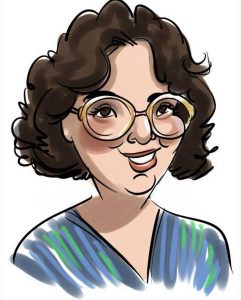 Ginger Williams ’85
Ginger Williams ’85
This summer we are highlighting Furman University alumni who work as library and information professionals. This is part 9 in this series; to view previous blog posts click here.
Ginger Williams is our ninth alumni to be featured, and she has had a very extensive career. She holds three advanced degrees – two in librarianship and a law degree! She has worked in school libraries, transitioned a library into the digital age, been a tenured faculty member, and now oversees a large department in the library at Texas State University.
Tell us a little bit about how you chose to work as a library and information professional?
“I was thinking about a Ph.D. in history and college teaching, but Dr. Spear very gently pointed out that both doctoral programs and the history faculty job market are best suited to passionate historians. I like history, but I’m not passionate about it. I had taken some accounting classes at Furman, and learned that I enjoy dealing with financial information although I didn’t want to do that full time. I’m passionate about learning new things, organizing information, helping people find information, evaluating programs, and stretching budgets. Librarianship seemed to fit.”
What has been your professional path to your current position?
“I pursued an M.Ln. and J.D. simultaneously, planning to become an academic law librarian. The law librarians graciously provided me with a variety of experience during my three years as a graduate assistant in the law library, but I decided against spending my career in the high pressure law school environment. I finished the coursework for school library certification while working as a graduate assistant in reference at USC-Aiken. I enjoyed both working with undergraduates and the opportunity to do a little of everything during my practicum in a high school library, so I applied for both college reference and high school library jobs. My first offer was a high school library job near home, just after my father became seriously ill, so I moved home for a year or two. The World Wide Web was created. I converted the card catalog to computer, successfully wrote grants for library and classroom technology, introduced Microsoft Office and the Internet to teachers and students, and was active in the SC Association of School Librarians. I eventually transferred to school district administration, where both grant writing skills and broad knowledge of curriculum gained as a school librarian were useful. After fourteen years in K-12 education, I quit work for a year to earn a specialist’s degree, with the goal of becoming a technical services librarian. I did an internship in technical services at Winthrop University, then accepted a position as assistant professor and assistant collections officer at Mississippi State University. I became active in the Association for Collections and Technical Services, published a couple of peer-reviewed journal articles, helped with transition from print to e-journals, moved to Wichita State University in Kansas as Acquisitions Librarian, published a few more articles, instituted e-book purchasing, and was promoted to associate professor with tenure. I gave up faculty status and tenure to come to Texas State University, where I manage a fourteen person department and eight million dollar budget to supply the information needs of 38,000 students. It’s challenging, rewarding, and (usually) enjoyable.”
What is the most interesting library in which you’ve worked?
“All of them! The school library had quirky teens and the introduction of the World Wide Web. The academic libraries had quirky profs who introduced me to topics I’d never considered. Where but a library would you learn – all in the same morning – that cows have problems with diarrhea, John Grisham’s novels have been translated into dozens of languages you’ve never heard of, and wax cylinder jukeboxes and player pianos are still in demand?”
What is something you have been surprised by during your career?
“I’ve been surprised that principles and theories I learned in law and library school are still valid today, even though practice changes constantly. My law school education has been valuable everywhere I worked, as have the writing skills that Dr. McArthur fostered in English 101.”
